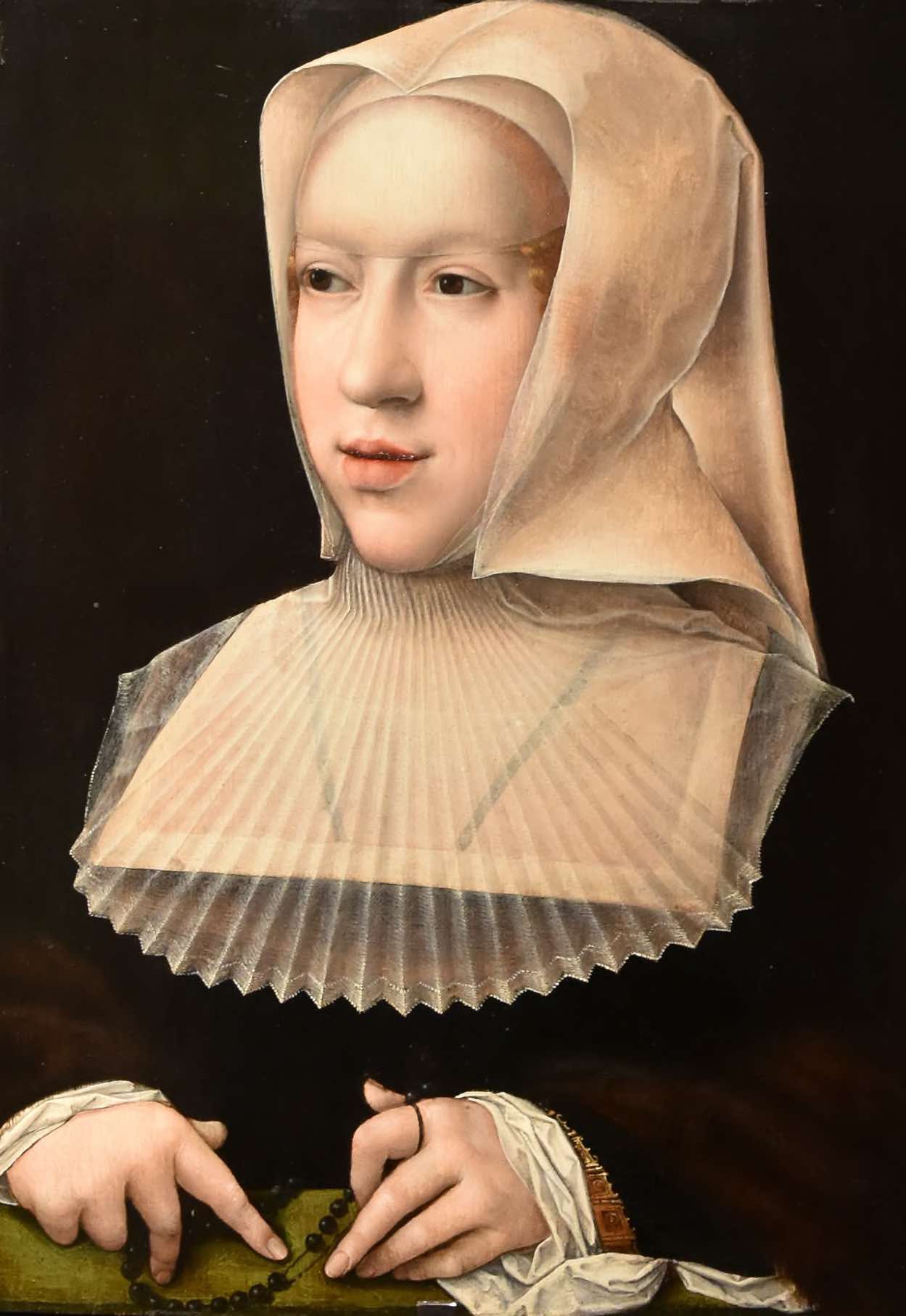From the Hof van Savoye to the Prinsenhof
Music during the time of Margaret of Austria and Charles V
MARGARET OF AUSTRIA
Tous les regretz
La Bernardina
Fors Seulement
Tandernaken
Je ne fay plus
S’elle m’amera
Ricarda Ottava
Pour ung jamais
Tous nobles coeurs
Antoine Brumel (1460 – 1515)
Josquin Desprez (ca. 1450/55 – 1521)
Johannes Ockeghem (1410 – 1497)
Jakob Olbrecht (ca. 1457 – 1505)
Antoine Busnois (1430 – 1492)
Johannes Ockegem
Diego Ortiz (1510-1570)
Pierre de la Rue (1460 – 1518)
Pierre de la Rue
CHARLES V
Fortune hellas
Alix avoit aux dents la malerage
Quand me souvient
Response: Ung triste cueur
Ung gay bergier
Dedans Tournai
Thomas Crecquillon (1505 – 1557)
Thomas Crecquillon
Diminuties van Girolamo dalla Casa
Thomas Crecquillon
Thomas Crecquillon
Diminuties van Bassano
Thomas Crecquillon

Bernard van Orley – Margaret of Austria

Bernard van Orley – Charles V
Tous les regretz qu’oncques furent au monde
Venez a moy, quelque part que je soye
Prenes mon cœur en sa doleur par fonde
et le fendes que ma dame le voye
MARGARET OF AUSTRIA
Tous les regretz
La Bernardina
Fors Seulement
Tandernaken
Je ne fay plus
S’elle m’amera
Ricarda Ottava
Pour ung jamais
Tous nobles coeurs
Antoine Brumel
Josquin Desprez
Johannes Ockeghem
Jakob Olbrecht
Antoine Busnois
Johannes Ockegem
Diego Ortiz
Pierre de la Rue
Pierre de la Rue
CHARLES V
Fortune hellas
Alix avoit aux dents la malerage
Quand me souvient
Response: Ung triste cueur
Ung gay bergier
Dedans Tournai
Thomas Crecquillon
Thomas Crecquillon
Diminuties van Girolamo dalla Casa
Thomas Crecquillon
Thomas Crecquillon
Diminuties van Bassano
Thomas Crecquillon

Bernard van Orley – Margaret of Austria

Bernard van Orley – Charles V
This beautiful and sad poem is written in 1493 by Octavien de Saint-Gelais on Margaret’s eve of departure from the French court. In many ways it symbolizes the hardships and setbacks that Margaret of Austria will encounter in her further life.
Born in 1480, at the age of two Margaret was divorced from her parents, Maximilian from Austria and Mary of Burgundy, to be raised at the French court of Louis XI as the future bride of his son, the dauphin Charles VII. There she developed a preference for French poetry and music, which would stay with her for the rest of her life. In 1491, however, her engagement was rejected in favor of Anne de Bretgane, and Margaret had to leave the court in 1493.
Then she first married prince John, son of Ferdinand and Isabelle of Spain and after his early death she married Philibert II of Savoy. In 1506, two years after his unexpected death, she returned to the Netherlands as duchess of Savoy to take on the regency for her nephew Charles V.
In Mechelen, Charles was raised at the court of his aunt Margaret of Austria, governor of the Netherlands at the time.
Important proof of the musical life that Margaret cultivated at the court can be found in two manuscripts. The two chansonniers (song books) contain chansons and motets of many Franco-Flemish composers who were connected or worked directly at the court of Margaret: Pierre de la Rue, Alexander Agricola, Antoine Brumel and others. The chansonniers contain many biographical references to her life, such as the collection of regrets-pieces (fourteen in both manuscripts) and songs composed on her self-written poem Pour ung Jamais.
On February 24th of 1500, Charles V was born at the court ten Walle. From then on, this place was called Prinsenhof (court of the prince). In August of 1477, the marriage of Margaret parents, Maximilian of Austria and Mary of Burgundy, took place here. The citizens of Ghent showed resistance against the emperor’s measures, and so emperor Charles came back to his hometown to receive the city council at the Prinsenhof.
Since emperor Charles was travelling very often, he did not leave a big stamp on one specific residence. Also mobile was the Capilla Flamenca, founded by Charles in 1515. In addition to the necessary clergymen, this court chapel consisted of a few dozen of the best singers and musicians of the time. For the musical quality of the liturgical services, Capilla Flamenca’s musicians travelled with Charles as part of his imperial court. Crecquillon was Kapellmeister and composer at the court of Charles. Very little is known about him, but he has left an impressive musical oeuvre.
Jole de Baerdemaeker & Adelheid Glatt
Translation: Johanna Lambrechts